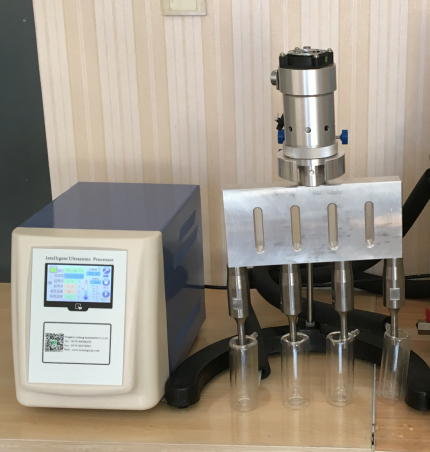The Xianou series ultrasonic cell crusher (ultrasonic disruptor) is a multifunctional and multi-purpose instrument that uses ultrasonic waves to generate cavitation effects in liquids; It can be used for the fragmentation of various animals, plants, viruses, cells, bacteria, and tissues, as well as for emulsification, separation, homogenization, extraction, defoaming, cleaning, preparation, dispersion, and acceleration of chemical reactions of nanomaterials. This machine has been widely used in teaching, research, and production in fields such as biology, microbiology, physics, zoology, agriculture, and pharmaceuticals. This machine is a new product with comprehensive functions, beautiful appearance, and reliable performance. The instrument adopts a large screen display, centralized control by a central microcomputer, arbitrary setting of ultrasonic time and power, sample temperature detection display, actual frequency display, frequency microcomputer tracking, and automatic fault alarm. All functions are displayed on the large LCD screen.
Users can process 4 samples at once and maintain consistency in sample processing. Enable users to process samples quickly, efficiently, and consistently.
|
model |
XO-3000D-4T |
|
Display method |
touchscreen |
|
Ultrasonic power(W)1%-99% |
20-3000 |
|
Operating frequency(KHz) |
20 |
|
Processing volume(ml) |
15-300ml*4 |
|
Random magnitude(mm) |
Φ8orΦ10*4 |
|
Ultrasonic pulse turn-on time(S) |
0.1-99.9 |
|
Ultrasonic pulse shutdown time(S) |
0.1-99.9 |
|
Total working time(M) |
1-99H59M59S |
|
Temperature protection range(℃) |
0-99 |
|
Data storage function |
There are 20 groups |
|
Power supply voltage(V) |
220V/50Hz |
The Chinese Academy of Sciences Nanjing Institute of Geography and Lakes, the Experimental Animal Center of the Beijing Academy of Military Medical Sciences, the Chinese Academy of Sciences Shanghai Institute of Biochemistry and Cell Biology, the School of Chemical Engineering of Nanjing University of Science and Technology, the School of Life Sciences of Nanjing Agricultural University, the Institute of Veterinary Medicine of Jiangsu Academy of Agricultural Sciences, the School of Environment of Nanjing University and other relevant units have adopted the modified equipment and published articles, such as: Jun Wu, Xuewei Liao, Fangbo Yu, Zhongbo Wei, and Liuyan Yang. (2012) Cloning of a dibutyl phthalate hydrolase gene from Acinetobacter sp. strain M673 and functional analysis of its expression product in Escherichia coli. Applied Microbiology and Biotechnology. DOI 10.1007/s00253-012-4232-8. (SCI, IF: 3.425)( Research on Environmental Microorganisms) School of Environment, Nanjing University.



